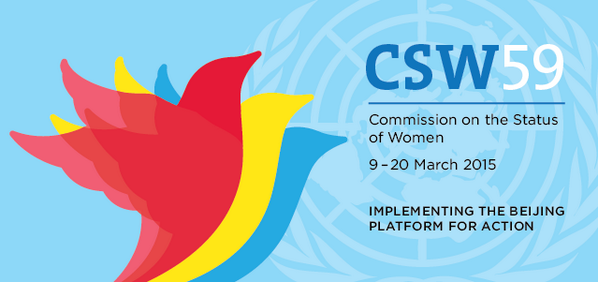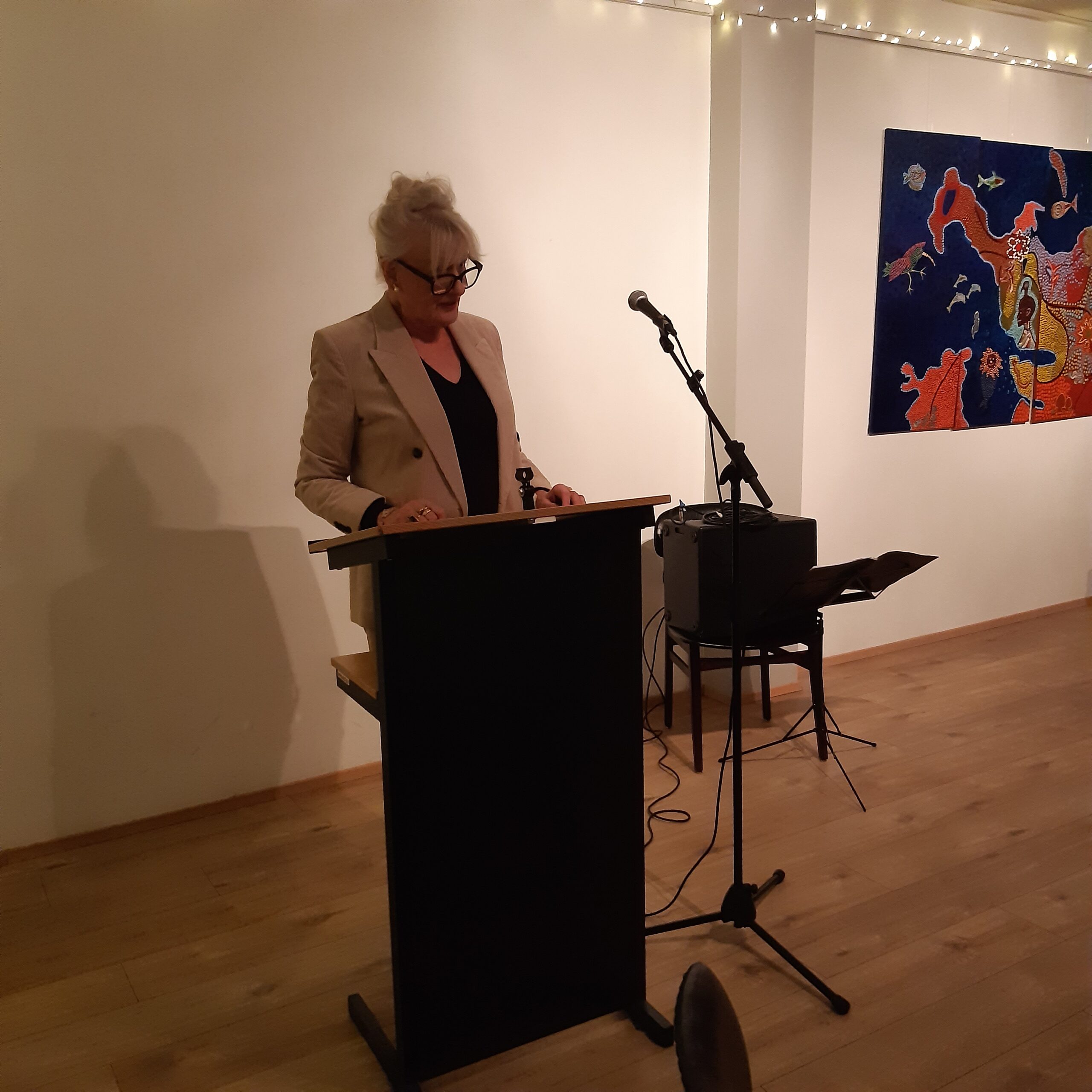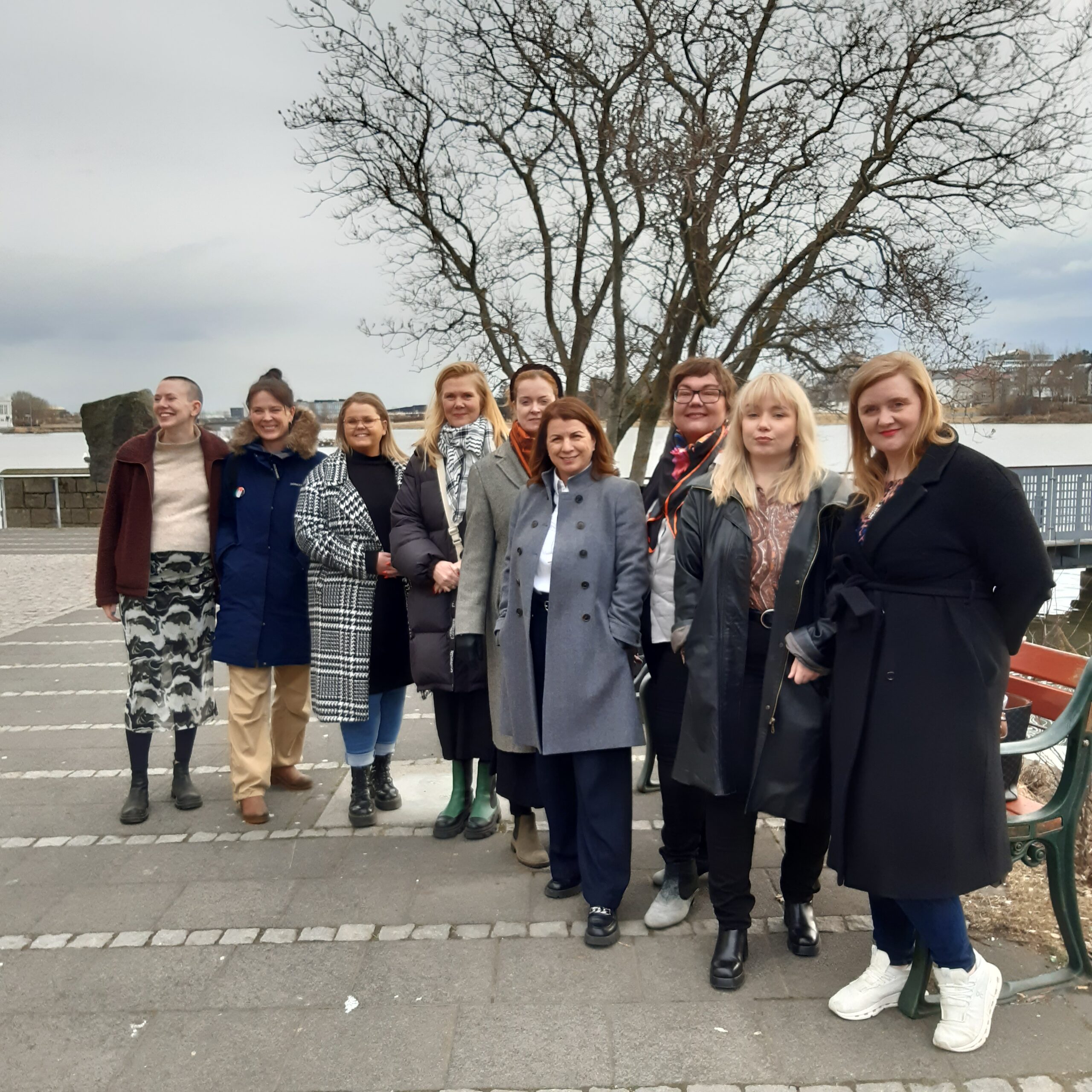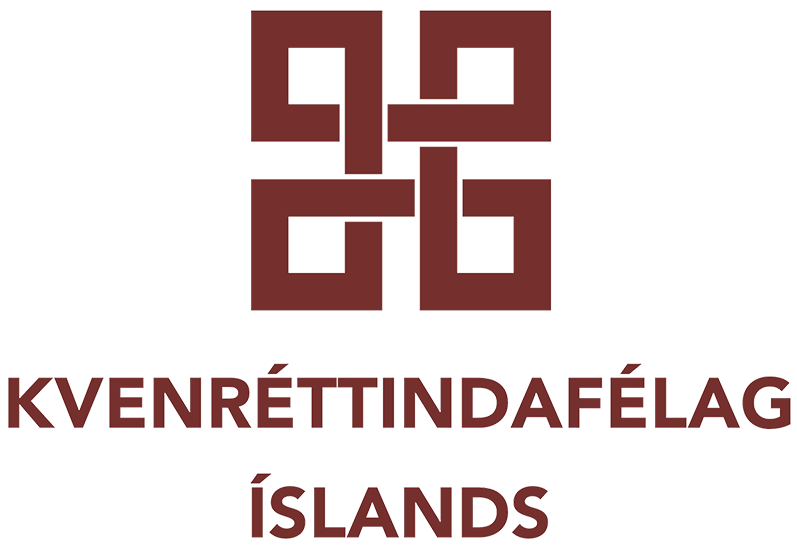
20. mars síðastliðin lauk 59. fundi Kvennanefndar Sameinuðu þjóðanna. Á fundinum var haldið upp á að að 20 ár væru liðin frá því að Pekingsáttmálinn var undirritaður á 4. heimsþingi SÞ um málefni kvenna.
Síðustu tuttugu árin hefur staða kvenna breyst töluvert í öllum löndum heims. Í sumum löndum, eins og okkar, hefur hún batnað snarlega. Í öðrum hefur hún versnað töluvert. Nú er svo komið að lönd heimsins veigra sér við að boða aftur til heimsþings þar sem rætt er um stöðu kvenna, því talið er að ef sumir kaflar Pekingsáttmálans væru aftur opnaðir, kaflar eins og sem tryggja eiga kynfrelsi kvenna, myndi ekki nást samstaða um þá.
Þessi 59. fundur Kvennanefndar Sameinuðu þjóðanna var því kostulegur, að líta til framtíðar þegar við þorum ekki einu sinni að krefjast þess að ákvæði þess sáttmála sem þegar hefur verið undirritaður sé framfylgt.
9. mars 2015, á opnunarfundi Kvennanefndar Sameinuðu þjóðanna, var samhljóða samþykkt ráðherrayfirlýsing í tilefni þess að 20 ár eru liðin frá því að Pekingsáttmálinn var undirritaður og Pekingáætlunin samþykkt. Þessi yfirlýsing var skrifuð á bak við læstar dyr og höfðu kvennasamtök lítinn sem engan aðgang að þeim samningaviðræðum sem áttu sér stað við ritun hennar.
Um eitt þúsund samtök út um allan heim, þ.á.m. Kvenréttindafélag Íslands, skrifuðu undir ályktun þar sem því er mótmælt að Kvennanefnd Sameinuðu þjóðanna skuli ekki með virkum og afgerandi hætti samþykkja mannréttindi kvenna og tryggja áframhaldandi jafnréttisbaráttu þjóða heimsins. Hægt er að lesa þessa ályktun hér.
Kvenréttindabaráttan verður sífellt mikilvægari í samfélagi okkar, og er grundvöllur framtíðarþróunar. Þessa dagana er oft rætt um að fjórða bylgja femínismans sé að skella á ströndum okkar. Sífellt fleiri hér á landi og erlendis gera sér grein fyrir mikilvægi jafnréttisbaráttunnar og starfa með virkum hætti að jafnréttismálum.
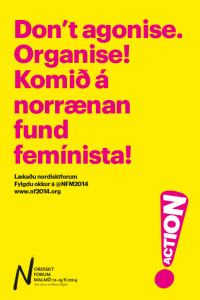 Í júní 2014 var haldin samnorræna kvenna- og jafnréttisráðstefnan Nordiskt Forum í Malmö í Svíþjóð. Að baki ráðstefnunni stóðu kvennasamtök af öllum Norðurlöndunum, þ.á.m. Kvenréttindafélag Íslands, og ráðstefnuna sóttu þrjátíu þúsund gestir heim.
Í júní 2014 var haldin samnorræna kvenna- og jafnréttisráðstefnan Nordiskt Forum í Malmö í Svíþjóð. Að baki ráðstefnunni stóðu kvennasamtök af öllum Norðurlöndunum, þ.á.m. Kvenréttindafélag Íslands, og ráðstefnuna sóttu þrjátíu þúsund gestir heim.
Aðalskipuleggjandi ráðstefnunnar, sænsku kvenfrelsissamtökin Sveriges Kvinnolobby, sendi formlega yfirlýsingu til Kvennanefndar Sameinuðu þjóðanna í desember 2014, þar sem Kvennanefndin var hvött til að líta til niðurstaðna þessarar ráðstefnu við skipulagningu fundarins í New York í mars í ár.
Bagalegt er að þessar afdráttarlausu kröfur þrjátíu þúsund norrænna femínista (lesið 62 kröfur norrænna femínista í heild sinni, hér!) hafi ekki fengið ekki áheyrn í ráðherrayfirlýsingunni sem samþykkt var á þessum 59. fundi Kvennanefndar Sameinuðu þjóðanna!
Hægt er að lesa þessa yfirlýsingu í heild sinni á vefsíðu Sameinuðu þjóðanna, en hún er einnig endurprentuð í heild sinni hér að neðan.
Statement submitted by Sveriges Kvinnolobby, a non‑governmental organization in consultative status with the Economic and Social Council
Statement
Since the adoption of the Beijing Platform for Action in 1995, the world has undergone important transformations which impact women and men differently. However, poverty still has a woman’s face. The women’s movement continues to demand the right to participate in all aspects of decision-making and that women’s experiences and knowledge are taken into account in international negotiations, national policies and research on economic and social systems. The respect for women’s human rights and gender equality are necessary ingredients for global sustainable development.
The Nordic Women’s movement, with Sveriges Kvinnolobby at the forefront, engaged in an extended review process of feminist challenges in the new development agenda, which culminated in June 2014 with the regional conference Nordiskt Forum Malmö “New Action on Women’s Rights”. Nordiskt Forum resulted in an outcome document with analyses and demands for making the Beijing Platform for Action a reality in the Nordic countries. The document was formulated through intensive discussions at different levels, based on the Beijing Platform for Action and Convention on the Elimination of All Forms of Discrimination against Women. Sveriges Kvinnolobby would like to emphasize five key areas presented in the Final Document: Feminist Agreements and Demands.
Women and Poverty: Feminist Economy — Economic and Social Development
The strategic objectives on women and poverty in the Beijing Platform for Action remain central for action globally. We request research on how macroeconomic principles and models sustain inequality and how to adjust models to include the gender dimension, in order to create a fair and sustainable society.
Feminist economy and research consider women’s and men’s daily lives and different living conditions, striving to create a balance between productive and reproductive functions in society. We sustain that gender equality is a determining factor for good economic, social and sustainable development. Time has come for governments to live up to their commitments in Beijing. To make economic policies gender sensitive governments should:
- Introduce Gender budgeting national in budgets and ensure that results are measured and made public.
- Ensure that unpaid care work is visible in national accounts and reflected in economic models.
- Promote women’s economic independence and rights, including access to remunerated work and satisfactory working conditions.
- Define actions to reduce income differences between women and men.
- Ensure that global economic crises are analysed from a gender perspective both in terms of causes and consequences.
Health
The significance of sex and gender on health, disease and treatment is well known, but insufficiently researched to achieve an equivalent health care for all. A gender perspective in all health care interventions should be guaranteed and services provided with attention to the physical integrity of women.
We further request that both women and men be provided quality advice on sexual and reproductive health and rights. Women’s right to decide over their own bodies, sexuality, pregnancies are cornerstones of a gender equal society. Restrictions on abortion rights are expanding, but experience show that bans on abortions do not lead to fewer abortions, but rather to more risky ones.
- Allocate resources to gender-specific health research which lead to gender equality in diagnosis, investigation, treatment and monitoring of disease.
- Develop healthcare systems and judicial procedures which recognize women’s experiences of rape, sexual abuse and violence in a manner which guarantees respect for the individual’s integrity and legal rights.
- Guarantee compulsory sex education of good quality, access to modern contraceptives, safe pregnancies and delivery care, as well every woman´s access to sexual and reproductive health and rights.
Violence against Women
Sexual harassment and abuse, rape, psychological and physical violence, genital mutilation, forced marriages, prostitution and trafficking in women describe but a few of the criminal acts committed against women and girls worldwide. Violence against women have impacts on human rights, democracy, public health, gender equality, and must be a major concern to every society and nation. We call attention to the Secretary-General’s campaign “SAY NO — UNiTE to end violence against women” and encourage member states to strengthen the campaign and implement it nationally.
- Establish the root causes of violence and abuse against women in different societies and develop national action plans, with clearly defined targets and allocated adequate resources, to decisively protect women’s right, including provision of women’s shelters.
Sveriges Kvinnolobby notes with concern attempts to weaken language in international organizations on prostitution in women and girls. We consider the purchase of sexual services a violence against women. In 1999 Sweden adopted a law to combat the demand side of prostitution, internationally known as the Nordic model, which criminalizes the purchase of sexual services. This law has given police and prosecution authorities’ tools to combat trafficking in human beings and has substantially changed attitudes about purchase of sex in Sweden. Norway adopted a similar law, and extended its application to acts of prostitution committed by nationals outside national borders. The European Parliament adopted in February 2014 the “Honeyball resolution” which recognizes that prostitution violates human rights and dignity and is an obstacle to equality between women and men.
- All nations should establish independent national rapporteurs on prostitution and trafficking in human beings to work closely with civil society, particularly with women’s organizations.
- Develop legislation to criminalize the purchase, but not sale of sexual services, support victims through robust exit strategies and reinforce capacity of the police and the judiciary to prosecute sex buyers, pimps and organized crime.
We are further concerned of the increase in use of surrogate motherhood. It is a violation of women’s bodily integrity, dignity and human rights, as well as a violation of the right of the child. It is urgent for the United Nations to investigate and establish the human rights basis for abandoning such practices.
- We demand the appointment of an international Special Rapporteur on surrogate motherhood, to evaluate the extent of commercial exploitation of women’s bodies and establish the basic human rights principles to protect women’s and children’s rights in situations of surrogate motherhood.
Environment, Climate Change and Sustainable Development
Environmental and climate change are the greatest challenges facing the world. Women must be involved in defining needs, discussing solutions and participate in decision-making. Research on the consequences for women of climate change must be prioritized. Issues ranging from food production, access to food, water and energy and disaster risk reduction, to resource management, transport and technological innovations that reduce environmental impact, all require the participation of women in order to find solutions. Women are underrepresented in all areas and at all levels of political processes and decision-making towards sustainable development. The responsibility to deal with environmental pollutants, emissions and their effect on human health and society often rests with individual women. Sustainable development requires a holistic approach with an integrated gender perspective based on ecologic, economic and social conditions.
- Ensure women’s political participation and decision-making in environmental and climate processes. In all international negotiations on climate change, sustainable environmental and disaster risk reduction, women should make up 50 per cent.
- Develop international control mechanisms to eliminate environmental pollutants and make polluters pay. Facilitate development of a green economy and green jobs.
- Protect women’s sexual and reproductive health and rights during environmental and climate-related disasters and prevent violence and trafficking targeting women and children during natural disasters.
New Technology and Media
Equal participation and representation of women in media is vital for democratic discourse.
Rapid technology progresses expand opportunities but at the same time increase differences in participation of women and men. Lack of adopted policies on regulation of the Internet has led to increasing hostility and harassment against women active in social media, which threaten to silence women’s voices in the public sphere.
We are deeply concerned about stereotypic and sexist portrayals of women in media which foster the perception of women as sexual objects and degrade women’s role in society. These diminish the respect for women’s human rights and can be linked to violence against women. The massive increase of pornography and paedophilia on the Internet, affects girls and boys, women and men, and impact negatively on gender equality in a broader context.
- Develop and implement models for women’s participation and non‑stereotypical representation in public service media which can also be used by commercial media actors.
- Develop legislation against sexist advertising and make the advertising industry obligated to provide information on any photo-shopping of images.
- Investigate the impact on pornography in relation to gender equality and legal measures to limit pornography on the Internet.

